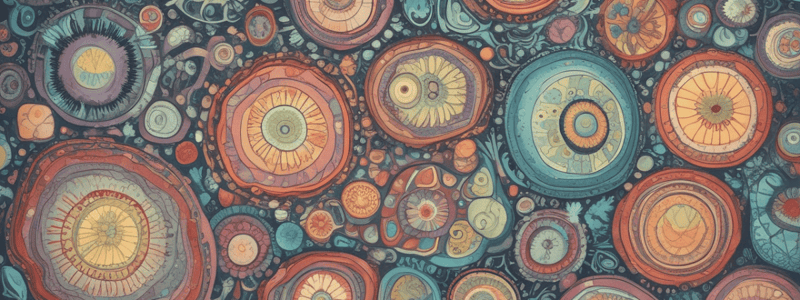Podcast
Questions and Answers
What is the primary function of mitochondria in a cell?
What is the primary function of mitochondria in a cell?
- Regulate what enters and leaves the cell
- Generate energy for the cell (correct)
- Protein synthesis
- Store genetic information
What is the process by which plants convert light energy into chemical energy?
What is the process by which plants convert light energy into chemical energy?
- Photosynthesis (correct)
- Meiosis
- Cellular respiration
- Mitosis
What is the term for the study of the structure and function of biological molecules?
What is the term for the study of the structure and function of biological molecules?
- Molecular Biology (correct)
- Cell Biology
- Biochemistry
- Genetics
Flashcards are hidden until you start studying
Study Notes
Branches of Biology
- Botany: study of plants
- Zoology: study of animals
- Microbiology: study of microorganisms
- Ecology: study of interactions between organisms and their environment
- Biochemistry: study of chemical processes in living organisms
- Molecular Biology: study of structure and function of biological molecules
- Cell Biology: study of structure and function of cells
- Genetics: study of heredity and variation
- Evolutionary Biology: study of evolution and diversity of life
Biomolecules
- Carbohydrates: provide energy and structure
- Proteins: perform various functions (enzymes, transport, storage)
- Lipids: provide energy and structure
- Nucleic Acids: DNA and RNA, store genetic information
Cell Structure
- Plasma membrane: regulates what enters and leaves the cell
- Cytoplasm: gel-like substance inside the cell
- Nucleus: contains genetic material (DNA)
- Mitochondria: generate energy for the cell
- Endoplasmic reticulum: involved in protein synthesis and transport
- Ribosomes: site of protein synthesis
- Lysosomes: contain digestive enzymes
Cellular Processes
- Photosynthesis: process by which plants convert light energy into chemical energy
- Cellular respiration: process by which cells generate energy from glucose
- Mitosis: process of cell division
- Meiosis: process of gamete formation
Ecosystems
- Producers: organisms that make their own food (plants)
- Consumers: organisms that obtain energy by consuming other organisms
- Decomposers: organisms that break down dead organic matter
- Food chains: series of organisms that eat other organisms
- Food webs: interconnected food chains
Evolution
- Natural selection: process by which populations adapt to their environment
- Speciation: process by which new species form
- Phylogeny: study of evolutionary relationships between organisms
- Fossil record: chronological record of life on Earth
Human Biology
- Systems of the human body:
- Nervous system: controls and coordinates body functions
- Circulatory system: transports oxygen and nutrients
- Respiratory system: exchange of oxygen and carbon dioxide
- Digestive system: breaks down and absorbs nutrients
- Immune system: defends against pathogens and diseases
Studying That Suits You
Use AI to generate personalized quizzes and flashcards to suit your learning preferences.



